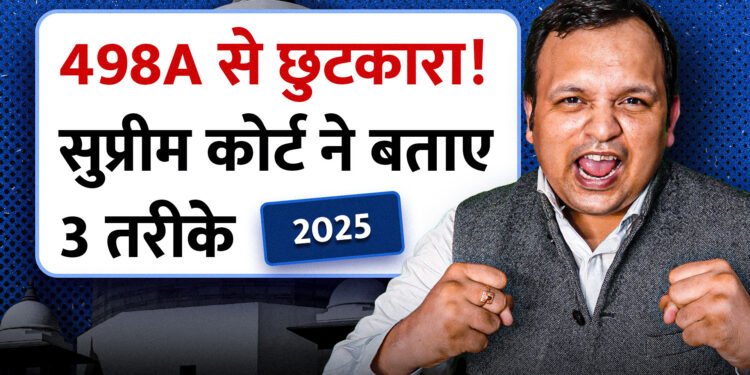Introduction
The 2025 Supreme Court case of Suman Mishra v. State of Uttar Pradesh sheds light on a critical issue within India’s legal system: the misuse of dowry and domestic violence laws in matrimonial disputes. This landmark judgment provides crucial guidance on the quashing of First Information Reports (FIRs) under Section 482 of the Criminal Procedure Code (CrPC) when allegations lack prima facie evidence. The Court’s decision underscores the growing concern over the weaponization of criminal proceedings in family disputes, emphasizing the need for a balanced approach that protects both the complainant and the accused
To learn more about the topic, read the blog till the end, and if there lies any more doubt, feel free to reach out to us at; https://thelegalshots.com/legal-opinion/
Facts of the Case
- Marriage and Dispute: Rishal Kumar (Appellant No. 3) and Priyanka Mishra (Respondent No. 2) were married in 2016. Marital discord led to separation and a divorce petition filed by Rishal Kumar in 2021.
- Criminal Complaint: Following the divorce filing, Priyanka Mishra filed an FIR alleging domestic violence, dowry harassment, sexual assault, and other offenses against her husband and in-laws.
- Investigation and Charges: Police investigation found insufficient evidence for grave charges like rape. A charge sheet was filed for offenses under Sections 498A, 506, and 504 of the Indian Penal Code (IPC) and Sections 3 and 4 of the Dowry Prohibition Act, 1961.
- High Court and Supreme Court: The Appellants sought to quash the FIR in the Allahabad High Court under Section 482 CrPC, but their petition was dismissed. They then appealed to the Supreme Court.
Laws Involved
- Section 482 CrPC: This provision empowers High Courts to prevent abuse of process and secure the ends of justice. It allows for quashing FIRs in certain circumstances.
- Section 498A IPC: Deals with cruelty by husband or relatives of the husband.
- Section 376 IPC: Pertains to the offense of rape.
- Dowry Prohibition Act, 1961: Prohibits the giving or taking of dowry.
Issues Addressed
- Misuse of Process: Was the FIR and subsequent criminal proceedings an abuse of the legal process?
- Prima Facie Evidence: Was there sufficient evidence to support the allegations?
- Weaponization of Law: Were the proceedings used as a tool of harassment in the divorce dispute?
- Judicial Review: Did the High Court err in dismissing the quashing petition?
Supreme Court’s Interpretation
The Supreme Court, in its judgment dated February 12, 2025, observed the following:
- Lack of Prima Facie Evidence: The police investigation did not find substantial evidence to support the serious allegations, including rape.
- Misuse of Legal Process: The Court noted that the criminal proceedings appeared to be used as a tool of harassment in the context of the matrimonial dispute, especially as the Appellant No. 3 had already remarried.
- High Court’s Error: The Allahabad High Court failed to conduct a thorough analysis before dismissing the quashing petition.
Key Takeaways
- Preventing Misuse of Dowry Laws: The judgment aims to curb the misuse of dowry laws for settling personal scores in matrimonial disputes.
- Need for Prima Facie Evidence: The Court emphasized the necessity of sufficient evidence to support serious accusations before initiating and continuing criminal proceedings.
- Balancing Rights: The decision underscores the importance of protecting the rights of both the complainant and the accused in matrimonial disputes.
Recent Study
A recent study by the National Commission for Women (NCW) revealed that a significant percentage of dowry harassment cases are false or exaggerated, highlighting the need for careful scrutiny of such complaints.
Related Landmark Judgments
- Rajesh Sharma v. State of Uttar Pradesh (2017) – Guidelines issued to prevent misuse of Section 498A IPC.
- Arnesh Kumar v. State of Bihar (2014) – Supreme Court set conditions for arrest in dowry cases.
- Inder Mohan Goswami v. State of Uttaranchal (2007) – Discussed abuse of criminal law in civil disputes.
- Preeti Gupta v. State of Jharkhand (2010) – Highlighted false complaints under Section 498A IPC.
- Social Action Forum for Manav Adhikar v. Union of India (2018) – Reaffirmed safeguards against the misuse of domestic violence laws.
This case serves as a crucial reminder that while laws are meant to protect, they should not be misused to cause injustice. The judiciary plays a vital role in ensuring that the pursuit of justice is not compromised by personal agendas.
Conclusion
The Supreme Court’s verdict in Suman Mishra v. State of Uttar Pradesh is a crucial precedent in preventing the weaponization of criminal law in matrimonial disputes. While protecting women’s rights is paramount, courts must ensure that legal provisions are not misused to harass innocent individuals. The ruling reinforces judicial prudence in cases where criminal law intersects with personal relationships, setting a strong example for future legal proceedings.
If doubts still persist, contact our Legal Experts at https://thelegalshots.com/legal-opinion/




